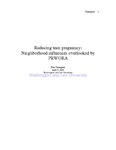Reducing teen pregnancy: Neighborhood influences overlooked by PRWORA

View/
Author
Thompson, Erin L.
Subject
Washington and Lee University, Shepherd Poverty Program
Personal Responsibility and Work Opportunity Reconciliation Act of 1996 (United States)
Teenage pregnancy -- Prevention
Health education
Sexual abstinence
Single mothers
Neighborhoods
Big Brothers/Big Sisters of America
KIPP
Metadata
Show full item recordDescription
Erin L. Thompson is a member of the Class of 2008 of Washington and Lee University. Capstone; [FULL-TEXT FREELY AVAILABLE ONLINE] The increase in teenage sexual activity, STDs, and pregnancy are a great concern within the United States, and are rightly so. The negative consequences are astounding. Teenage mothers and their children are more likely to live in poverty and be on welfare. The children of single teenage mothers are more likely to develop cognitive and academic problems, and they are more likely to become teenage parents themselves. Everyone should be concerned with reducing the number of out-of-wedlock births. However, PRWORA [Personal Responsibility and Work Opportunity Reconciliation Act] clearly was not successful in doing so, and reasons for its lack of success are evident. Teenagers do not base their decisions on economic incentives/disincentive government policy or on sex education, the two main focuses of reducing illegitimacy within current government policy. [From Conclusion] Erin Thompson